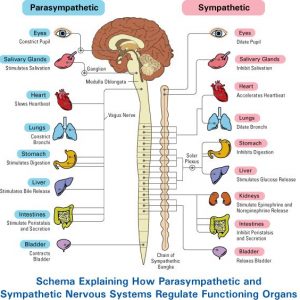Healing Chronic Stress and Anxiety
Stress is an interesting creature. It is often associated with work, school, or relationships, and most often it becomes chronic. As we’ve discussed in previous blogs, the stress response is designed to be a SHORT TERM response to a stressor. Initially a few things happen. Let’s say you get in trouble as a child, you have an argument as an adult, or you “almost” get in a car accident because of someone else’s fault.
The following occurs when you encounter a stressful event:
- Your brain recognizes this interaction or episode as a threat
- First, your amygdala immediately turns on your Fight or Flight (sympathetic system) to shunt blood away from your vital organs and complex brain centers- and shifts blood flow to less complex, reflexogenic systems to help keep you alive during this perceived threat. This is fast acting.
- Next, your hypothalamic-pituitary axis sends signals to your adrenal glands to excrete cortisol in large amounts. Cortisol is your main stress hormone, in the short term it is good to have, however in the long term it can be very bad for your health. Cortisol releases glucose from the liver to send blood sugar to muscles so you can run from the threat. This is slow acting.
- Following this increase in blood sugar, you will release insulin to counteract the increase in blood sugar that just occured from the stressful situation. Insulin is designed to decrease blood sugar, to open the doors for sugar to enter the cell.
Let’s say you typically recover quickly from a stressful event. Most times this actually can take hours to settle down, some of the most “relaxed” people will even recover from a stressful event in less than an hour (physiologically).
Now let’s say you are a “chronic stressor”. This means you tend to find the negative in things, are easily agitated by almost anything, always feel like you’re playing catch up, or are stuck in one or more toxic situations. THIS IS WHERE CHRONIC STRESS THRIVES. Chronic stress breaks down everything from your brain, your gut, your skin, your memory, your mood, and even disrupts your relationships around you.
Developing Chronic Stress Pathways
The problem with chronic stress is that it can neurologically become “plastic” and start presenting as Sympathetic Dominance or Anxiety. Neuroplasticity is the act of developing strong connections between neurons and those connections become very efficient. Learning a new skill and mastering it is an example of “good neuroplasticity” and chronic stress and something like anxiety is “bad neuroplasticity”.
Chronic Stress Becomes Anxiety
Anxiety is a vicious cycle. It typically starts because of a single or multiple stress responses, and if this “trigger” continues, then the stress will continue. If it continues long enough, it can develop into anxiety because the areas of the brain that perceive something as a threat (the amygdala) start seeing EVERYTHING as a stressor and threat. This is how chronic stress turns on the anxiety systems in the brain.
In order to truly heal from anxiety and health issues related to chronic stress, you must address all the broken down areas, including gut, brain pathways, and the mind (which controls your behaviors).

After a comprehensive evaluation, we begin retraining the brain to stop creating anxious pathways and begin creating calming pathways again. We help to rehab the gut via the brain-gut axis (see vagus nerve image), we help to rewire your mind to be positive again via NeuroFeedback and Brain Training, and we address the underlying metabolic issues associated with gut health and inflammation to help you get the most out of your experience at ACNC.
If you have chronic stress or anxiety, please give us a call to see if we are the office for you. 480-756-2600

